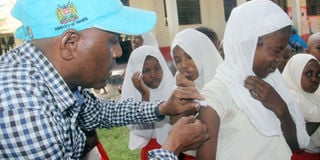WHO defends quality of tetanus vaccine

A medical officer administers tetanus vaccine to Miritini World Bank Primary School, Mombasa, pupils on May 16, 2016. WHO has said the tetanus vaccine is safe for use. PHOTO | LABAN WALLOGA | NATION MEDIA GROUP
What you need to know:
- Dr Eggers said the organisation is not involved in any campaign to sterilise the Kenyan women.
- Dr Eggers observed the vaccine had been used in over 50 countries across the globe without any complaint.
The World Health Organization (WHO) has dismissed claims by Opposition leader Raila Odinga that a tetanus vaccine being administered sterilised women.
WHO Country Director, Dr Rudi Eggers, said the claims were untrue, adding that the organisation is not involved in any campaign to sterilise the Kenyan women.
“The campaign was strictly geared towards the elimination of neonatal tetanus,” Dr Eggers told the Nation Friday.
ANTI-PREGNANCY
Mr Odinga kicked up a storm on Monday when he revisited the saga claiming that the tetanus vaccine had been confirmed to contain the human chorionic gonadotropin (b-HcG) hormone, which is an anti-pregnancy hormone that can sterilise women.
The National Super Alliance (Nasa) presidential candidate said analysis of samples used for the tetanus vaccination from highly regarded institutions on matters health such as AgriQ Quest Limited, Nairobi Hospital Laboratories and the University of Nairobi indicated that the vaccine had high contents of the hormone.
However, the WHO boss said the vaccine was developed to build immunity against tetanus in newborns, noting that it had proven effective in reducing cases of the infection worldwide.
INFANT MORTALITY
Dr Eggers said neonatal tetanus, which can develop in newborns from 12 hours to six weeks old, is a major cause of infant mortality and had been significantly reduced by the vaccination campaigns.
“In 1988, 787,000 infants died from neonatal tetanus as compared to just 34,019 in 2015, showing the WHO and Unicef’s remarkable success in the campaign against the infection,” he said.
He echoed the government’s position on the vaccine, noting the claims by the Catholic Church regarding the exercise were inaccurate since only three opened vials were found to contain the hormone.
MANUFACTURE
Dr Eggers said the WHO regularly carries out prequalification tests on all vaccines used in its campaigns “to ensure they meet the highest health and safety quality”.
“We carry out the highest possible standard of tests on the vaccines that are used in campaigns worldwide and the said vaccine had passed the pre-qualification tests before being allowed for use,” Dr Eggers said.
He, however, clarified that the vaccines were manufactured by private pharmaceutical campaigns.
“We don’t directly manufacture the vaccines or involve ourselves in any stage of the process.
"Our role is to test and pre-qualify the vaccines to ensure they meet the required standards of safety and efficacy before we allow them to be used in campaigns across the globe,” he said.
ANTIBODIES
The immunologist observed the vaccine had been used in over 50 countries across the globe without any complaint.
Dr Eggers said the vaccine works by stimulating the body to create protective antibodies to the tetanus toxin.
“As far as the WHO is concerned, the hormone is not a component in the manufacture of the anti-tetanus vaccine. There is, therefore, no possibility of b-HcG being found in the vaccine,” he added.
CATHOLIC CHURCH
He said that WHO has been using the vaccine for the last 40 years.
WHO carried out similar vaccination campaigns in Mexico in 1993 and in Nicaragua and the Philippines in 1994.
So far the vaccine has been used by 130 million women in 52 countries.
In making his claims, Mr Odinga agreed with the Catholic Church position on the vaccine, noting results of the tests had proven the vaccine contained high concentrations of the sterilising hormone.





